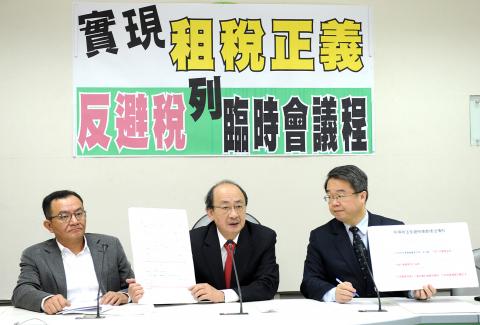The Democratic Progressive Party (DPP) caucus said yesterday that a proposed amendment to the Income Tax Act (所得稅法) would be the party’s main focus in the extra session that begins tomorrow, saying that it is the most important bill to address the issue of “tax justice” in the wake of the revelation of Taiwanese businesspeople’s exploitation of tax havens to avoid paying taxes.
“[The DPP] is proposing this to highlight our call for tax justice and as another test for the Chinese Nationalist Party’s [KMT] core values,” DPP caucus convener Ker Chien-ming (柯建銘) told a press conference.
The press conference was held before the legislative agenda is to be decided in an informal meeting today, in which lawmakers are to discuss the bill proposals to be listed on the agenda of the two-day extra session.

Photo: Lo Pei-der, Taipei Times
A two-year investigation project, conducted by the International Consortium of Investigative Journalists (ICIJ), found that more than 16,000 Taiwanese used “paper companies” in tax havens, such as the British Virgin Islands, to evade taxes.
The Chinese-language CommonWealth Magazine, a partner outlet of the consortium, estimated that up to NT$280 billion (US$9.23 billion) was kept abroad over the past 10 years to avoid taxes.
The DPP planned to propose amending Article 43 of the Income Tax Act to stop corporates from using overseas subsidiaries and paper companies to avoid taxation, Ker said.
The government’s failure to reform tax regulations produced a strange tax revenue structure, in which salaried workers contributed 75 percent of the total tax revenues, Ker said, adding that the tax rate of 12.8 percent in Taiwan ranked seventh lowest in the world and the lowest among Asian countries.
“Taiwan’s tax regulations have always favored the rich and large corporates. It is time to change that. We hope the KMT will not stand in the way,” Ker said.
The proposed amendment was going to the plenary session during the last legislative session in April last year until it was pulled from the agenda by the KMT a month later, DPP Legislator Wu Ping-jui (吳秉叡) said.
The DPP argued that amending the tax code would bring about better results to address fairness and justice, DPP Legislator Gao Jyh-peng (高志鵬) said.
The KMT has said that the amendment could lead to an exodus of more Taiwanese businesses and hurt foreign investment, but Gao dismissed those concerns saying that stricter tax regulations have been a global trend and those businesses trying to evade taxes should not be welcome in Taiwan.
Responding to the DPP’s initiative, KMT caucus secretary-general Lin Te-fu (林德福) said yesterday that the party did not oppose amending the law, but it did not welcome sloppy legislation and would prefer to deliberate the bill in the next legislative session.

ANOTHER EMERGES: The CWA yesterday said this year’s fourth storm of the typhoon season had formed in the South China Sea, but was not expected to affect Taiwan Tropical Storm Gaemi has intensified slightly as it heads toward Taiwan, where it is expected to affect the country in the coming days, the Central Weather Administration (CWA) said yesterday. As of 8am yesterday, the 120km-radius storm was 800km southeast of Oluanpi (鵝鑾鼻), Taiwan’s southernmost tip, moving at 9kph northwest, the agency said. A sea warning for Gaemi could be issued tonight at the earliest, it said, adding that the storm is projected to be closest to Taiwan on Wednesday or Thursday. Gaemi’s potential effect on Taiwan remains unclear, as that would depend on its direction, radius and intensity, forecasters said. Former Weather Forecast

As COVID-19 cases in Japan have been increasing for 10 consecutive weeks, people should get vaccinated before visiting the nation, the Centers for Disease Control (CDC) said. The centers reported 773 hospitalizations and 124 deaths related to COVID-19 in Taiwan last week. CDC Epidemic Intelligence Center Director Guo Hung-wei (郭宏偉) on Tuesday said the number of weekly COVID-19 cases reported in Japan has been increasing since mid-May and surpassed 55,000 cases from July 8 to July 14. The average number of COVID-19 patients at Japan’s healthcare facilities that week was also 1.39 times that of the week before and KP.3 is the dominant

The Chinese Communist Party’s (CCP) working group for Taiwan-related policies is likely to be upgraded to a committee-level body, a report commissioned by the Mainland Affairs Council (MAC) said. As Chinese President Xi Jinping (習近平) is increasingly likely to upgrade the CCP’s Central Leading Group for Taiwan Affairs, Taiwanese authorities should prepare by researching Xi and the CCP, the report said. At the third plenary session of the 20th Central Committee of the CCP, which ended on Thursday last week, the party set a target of 2029 for the completion of some tasks, meaning that Xi is likely preparing to

US-CHINA TRADE DISPUTE: Despite Beijing’s offer of preferential treatment, the lure of China has dimmed as Taiwanese and international investors move out Japan and the US have become the favored destinations for Taiwanese graduates as China’s attraction has waned over the years, the Ministry of Labor said. According to the ministry’s latest income and employment advisory published this month, 3,215 Taiwanese university graduates from the class of 2020 went to Japan, surpassing for the first time the 2,881 graduates who went to China. A total of 2,300 graduates from the class of 2021 went to the US, compared with the 2,262 who went to China, the document showed. The trend continued for the class of 2023, of whom 1,460 went to Japan, 1,334 went to